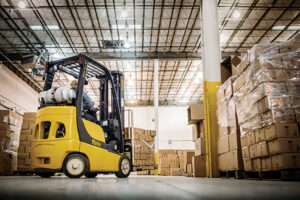PERC Encourages Material Handling Professionals to Decrease Forklift Emissions This Earth Day
 This Earth Day, the Propane Education & Research Council (PERC) is reminding material handling professionals that because of propane’s clean, low emissions profile, propane forklifts are a reliable and sustainable choice for both indoor and outdoor environments.
This Earth Day, the Propane Education & Research Council (PERC) is reminding material handling professionals that because of propane’s clean, low emissions profile, propane forklifts are a reliable and sustainable choice for both indoor and outdoor environments.
Research from PERC reveals propane forklifts provide a smaller carbon footprint than electric forklifts under several conditions. The analysis, Fork(lifts) in the (Off) Road: Should We Ban Internal Combustion Engines for Electric? debates California Air Resources Board (CARB)’s proposed ban on internal combustion engine (ICE) forklifts.
CARB’s mandate would ban all internal combustion engine forklifts including hybrid electric solutions, allowing only battery-powered and hydrogen fuel cell forklifts. The analysis from PERC compares the lifecycle profiles of propane and electric-powered forklifts, including carbon dioxide (CO2) and nitrogen oxide (NOx) emissions.
Findings for several states show that forklifts with conventional propane engines are superior to those powered by electricity, especially when considering marginal emissions. The case for internal combustion engine forklifts becomes even stronger with hybrids and renewable fuels. In fact, nearly all propane ICE forklifts technologies emit extremely low levels of criteria pollutants compared to the regulatory standards.
PERC conducted the analysis using available Environmental Protection Agency (EPA) certification emissions data to compare the CO2 and NOx lifecycle emissions of propane and electric forklifts.
The comparative analysis presented the following scientific findings:
- A zero-emissions forklift does not exist;
- Hybrid electric forklifts, with both conventional and renewable fuels, emit less CO2 than battery-electric forklifts;
- For most states, NOx emissions from propane-powered forklifts engines can be less than half that of battery-electric forklifts powered by the electric grid;
- Nearly 314,000 ICE forklifts are operating in California alone. Replacing all ICE forklifts in the state with battery-electric forklifts would require nearly 10 GWh/day of additional charging capacity; and
- Electrification as a means of decarbonization sounds attractive but as proven, is not real without completely consideration to lifecycle emissions.
For more information, visit https://propane.com.



